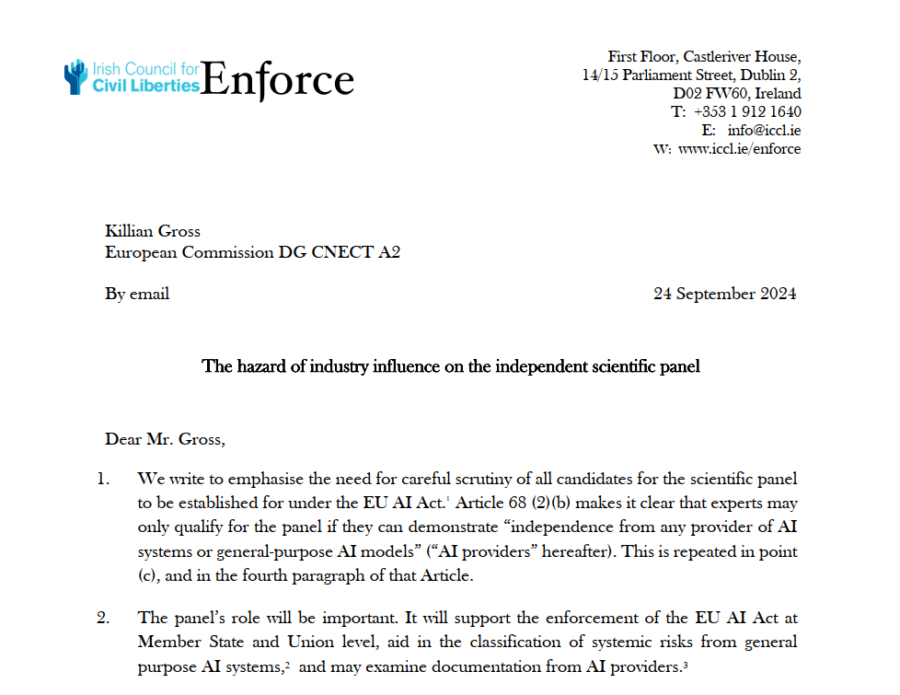24 September 2024
ICCL Enforce has written to the European Commission to carefully scrutinise the candidates for the scientific panel to be established under the EU AI Act. AI companies have heavily invested in capturing academia to indirectly influence regulators. Avoiding any conflicts in the scientific panel is the only way to eliminate such influence and keep it objectively impartial.
Killian Gross
European Commission DG CNECT A2
24 September 2024
Hazard of industry influence
on the independent scientific panel
Dear Mr. Gross,
- We write to emphasise the need for careful scrutiny of all candidates for the scientific panel to be established for under the EU AI Act.[1] Article 68 (2)(b) makes it clear that experts may only qualify for the panel if they can demonstrate “independence from any provider of AI systems or general-purpose AI models” (“AI providers” hereafter). This is repeated in point (c), and in the fourth paragraph of that Article.
- The panel’s role will be important. It will support the enforcement of the EU AI Act at Member State and Union level, aid in the classification of systemic risks from general purpose AI systems,[2] and may examine documentation from AI providers.[3]
- With such critical responsibilities and influence, the need for “impartiality and objectivity”[4] cannot be overemphasised. Decisions will be successfully challenged by AI providers if the panel is not objectively impartial, as occurred most recently in a pharmaceuticals case in March.[5] It is essential that the Commission avoid any appearance of conflict of interest in view of the global profile and legislative significance of the AI Act.
- AI Providers have invested heavily over many years to establish think tanks and capture academia as a means of indirectly influencing enforcers.[6] In such an environment, it will be impossible for the Commission to “actively manage”[7] conflicts of interests in the scientific panel.
- As noted by David Michaels, the longest serving Assistant Secretary of Labor for the Occupational Safety and Health Administration, “conflict of interest cannot be managed. It must be eliminated.”[8] We urge the Commission heed to this advice and not repeat the same mistakes as other sectors.
- Speaking earlier this month, U.S. Assistant Attorney General Kanter worryingly observed a diverse set of domains where “conflicts of interest and capture have become so rampant and commonplace that it is increasingly rare to encounter a truly neutral academic expert.”[9] A former Chief Economist of the European Commission made the same point this month.[10]
- The Commission is fortunate that along with Member States it funds the best academics in their fields, and will not find it difficult to establish an excellent and impartial scientific panel.[11]
Sincerely,
Dr Kris Shrishak
Senior Fellow, Enforce
Dr Johnny Ryan
Director, Enforce
Notes
[1] Regulation (EU) 2024/1689 of the European Parliament and of the Council of 13 June 2024 laying down harmonised rules on artificial intelligence and amending Regulations (EC) No 300/2008, (EU) No 167/2013, (EU) No 168/2013, (EU) 2018/858, (EU) 2018/1139 and (EU) 2019/2144 and Directives 2014/90/EU, (EU) 2016/797 and (EU) 2020/1828 (Artificial Intelligence Act). URL: https://eur-lex.europa.eu/eli/reg/2024/1689/oj
[2] AI Act, Article 52 (1)(b), 68 (3), 69.
[3] AI Act, Recital 163.
[4] AI Act, Article 68 (4).
[5] Judgement of 14 March 2024, Case C‑291/22 P, D&A Pharma v Commission and EMA, ECLI:EU:C:2024:228. See in particular paragraph 76.
[6] Abdalla, Mohamed, and Moustafa Abdalla. “The Grey Hoodie Project: Big Tobacco, Big Tech, and the Threat on Academic Integrity”. In Proceedings of the 2021 AAAI/ACM Conference on AI, Ethics, and Society, 287–97. Virtual Event USA: ACM, 2021. https://doi.org/10.1145/3461702.3462563; Mullins, Brody, and Jack Nicas. “Paying Professors: Inside Google’s Academic Influence Campaign,” The Wall Street Journal, July 14, 2017, https://www.wsj.com/articles/paying-professors-inside-googles-academic-influence-campaign-1499785286; Whittaker, Meredith. “The steep cost of capture.” Interactions 28.6 (2021): 50-55; Patterson, Mark R. “Conflicts of interest in scientific expert testimony.” Wm. & Mary L. Rev. 40 (1998): 1313.
[7] AI Act, Article 68 (4).
[8] Michaels, David. Doubt is their product: how industry's assault on science threatens your health. Oxford University Press, 2008.
[9] Kanter, Jonathan. “Assistant Attorney General Jonathan Kanter Delivers Remarks for the Fordham Competition Law Institute’s 51st Annual Conference on International Antitrust Law and Policy,” September 12, 2024, https://www.justice.gov/opa/speech/assistant-attorney-general-jonathan-kanter-delivers-remarks-fordham-competition-law-0.
[10] Valletti, Tommaso. “Debate: ‘Doubt Is Their Product’—The Difference between Research and Academic Lobbying.” Public Money & Management, September 2024, 1–3. doi:10.1080/09540962.2024.2404249.
[11] In the unlikely case that the Commission is unable to find the enough number of AI experts who are not conflicted, then we suggest that such experts be considered for the advisory forum but not the scientific panel.

